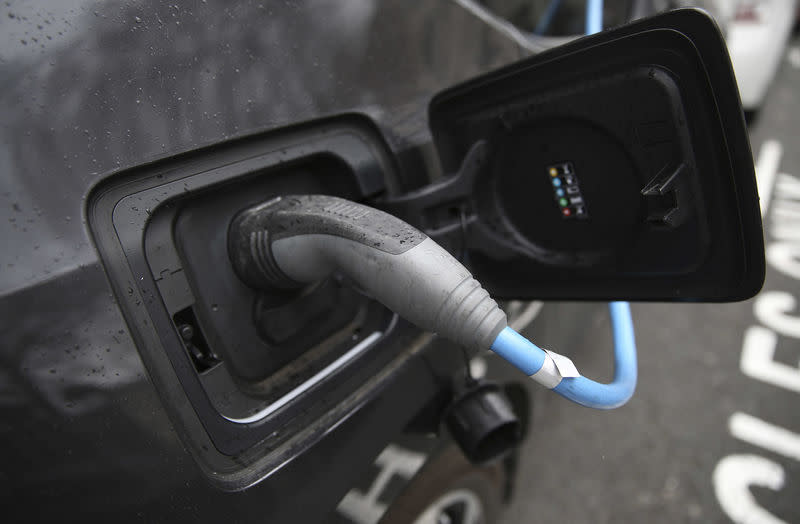Ontario’s focus on electric cars a challenge for auto industry

Ontario is hitting the gas pedal on adoption of the electric car, but in order to meet the government’s aggressive goals, consumers and industry will have to accept some big changes, according to experts.
The provincial government’s $7 billion climate-change strategy, leaked this week in The Globe and Mail, lays out $285 million in electric vehicle (EV) incentives, including up to $14,000 on each car purchased, as well as cheap power and a pledge to build charging stations. The goal is to have 12 per cent of all vehicle sales to be electric by 2025, compared to the current levels of a fraction of one per cent.
But don’t expect to be fighting lineups down at the Tesla dealership just yet, say analysts.
“Believe me, I would love to see more electric cars as much as everyone else, but 5 per cent by 2020 and 12 per cent by 2025… I think it’s a tad unrealistic,” says Kumar Saha, aftermarket research manager at consulting firm Frost & Sullivan.
Predictably, environmentalists are largely praising the move, while the traditional auto industry is raising concerns that offering incentives to avoid gas cars built in the province weakens an already shaky sector.
“We’ve got to keep what we have here,” Mark Nantais, president of the Canadian Vehicle Manufacturers’ association, told the Toronto Star.
While $14,000 a car could help reduce the sticker shock attached to pricier electric cars, the challenge of adopting the technology widely go beyond that, says Joe McCabe, president of AutoForecast Solutions.
“There’s a level a consumer acceptance that’s going to make it difficult to make that leap,” he says.
Beyond just incentives, you have to have cars that consumers actually want to purchase. As well, the benefits of electric technology might be less evident to the mainstream consumer in an environment where gas prices are relatively low.
Then there’s the issue of ‘range anxiety’ over cars that can’t go nearly as far on a single charge as a typical car can go on a tank of unleaded.
“Once you break over (a) 200-mile range on a charge, you’re going to start seeing more consumers take the (electric) vehicles more seriously in terms of what they want to purchase,” says McCabe.
And the local climate factors in, as electric cars are less efficient in cold weather.
Of course, even if Ontarians can be convinced to rapidly embrace electric vehicles, that still leaves the sticky question of the Ontario auto industry, which floats a sizeable chunk of the provincial economy.
With current manufacturing capacity in the province overwhelmingly geared to gas-powered cars, the province is not currently well positioned to capture the economic benefits of a push to electric, says Saha.
“In the short term we’re not going to get those electric vehicles volumes that will warrant that something be built in Canada,” he says.
More likely, electric vehicles would be imported from Michigan.
Of course, it’s natural to focus on the short term, and the longer-term shift towards green energy and industry is happening regardless of the current makeup of Ontario’s economy. Clean tech advocates say change shouldn’t be something to fear.
“Ultimately down the road, will Ontario remain a place where we bolt cars together? I’m thinking the answer’s possibly no,” says Ron Groves, manager of education and outreach at EV non-profit Plug’n Drive.
But he says Ontario has the potential to reposition itself in the longer-term as a hub electric vehicle technology.
“When you look at our colleges and universities, we have a tremendous amount of talent in this province, and we have a tremendous amount of companies which are manufacturing components for electric vehicles and hybrids around the world.”
What remains to be seen is whether the provincial government will set the stage for a strategic shift in the auto industry.
Ontario Minister of Economic Development Brad Duguid has said the province plans to position itself as a leader in “next generation production”, but there’s been little detail about what that means.
Of course, stirring consumer demand is one strategy to attract industry.
Groves sees the 12 per cent sales target as manageable, and says consumer adoption should follow improvements in infrastructure and technology.
“We think that around 2022, you will find the electric car and the gas car will reach what we call parity,” he says.
“I mean parity in price, parity in range.”
And Saha admits that even if the 12 per cent target is unrealistic, it could still spur action.
“Sometimes kind of setting yourself a very tough goal can be a way of goading the rest of us into at least making an attempt to get here.”

 Yahoo Finance
Yahoo Finance 
